Enjoy this post by Clare Levine, one of our Special Collections Freshman Fellows for the 2023-2024 academic year.
My name is Clare Levine and thanks to my great-grandma, I am a 4th-generation vegetarian. My great-grandmother, Fannie Shaffer, didn’t like the idea of killing animals to eat them, so she became a vegetarian in the 1920s. Shortly after becoming a vegetarian, she opened a vegetarian hotel, called The Vegetarian Hotel, in the Catskills of New York. She ultimately passed it down to her son and my maternal grandfather, Verb Konviser. While vegetarianism continued throughout the three generations, the love for running the hotel did not, and my mom and her sister elected not to take over, leading the hotel to shut down in the mid-1980s.
Being a vegetarian is a normal part of my life, but I didn’t know much about the history of vegetarianism in America. That’s why I decided to apply to the “Activist Cooking” project offered in the First-Year Fellows program. While Special Collections has numerous vegetarian cookbooks dating back to the 19th century, I have focused this semester on the links between vegetarianism and the American counterculture of the 1960s and 1970s. I am especially interested in Stephen Gaskin’s vegetarian commune called The Farm.
Stephen Gaskin was a spiritual, long-haired hippie who believed that through LSD, he could become telepathic and communicate with God and the Universe, and he also believed heavily in vegetarianism. He first preached his beliefs in San Francisco and quickly gained a following. But, this group needed a place to settle, so they boarded 63 school buses and drove from California to the great state of Tennessee.
In Summertown, Tennessee, The Farm was created, and the community building began. At first, the school buses were transformed into buildings because the land they were living on had quite literally no structures. After two years, there were tons of new builds, such as a laundromat, bathhouse, apartment buildings, community meeting halls, a canning and freezing facility, and of course, a kitchen.
As mentioned, Stephen’s two main focuses seemed to be vegetarianism and drugs. The Farm itself published many books giving non-commune members insight into their lives, with books such as Hey Beatnik!, Yay Soybeans!, and The Farm Vegetarian Cookbook. Something that is interesting is that Hey Beatnik! and The Farm Vegetarian Cookbook were $2.50 and $1.95, respectively. This exemplifies the accessibility of The Farm and how much Stephen was trying to spread his ideologies by making it extremely easy to read the works about life on The Farm and about The Farm itself. Hey Beatnik! focuses on the entirety of life on the Farm, much past the vegetarian aspect. The book starts off with a very long, spiritual note from Stephen and continues by stating that the book is a “commercial for God.” Hey Beatnik! is advertised as a vegetarian book, so at this point, I was confused due to the lack of vegetarianism mentioned. A question popped into my head of whether the purpose of this book was to actually spread the idea of vegetarianism, or if the purpose was to convince readers to stop being squares and join his commune.
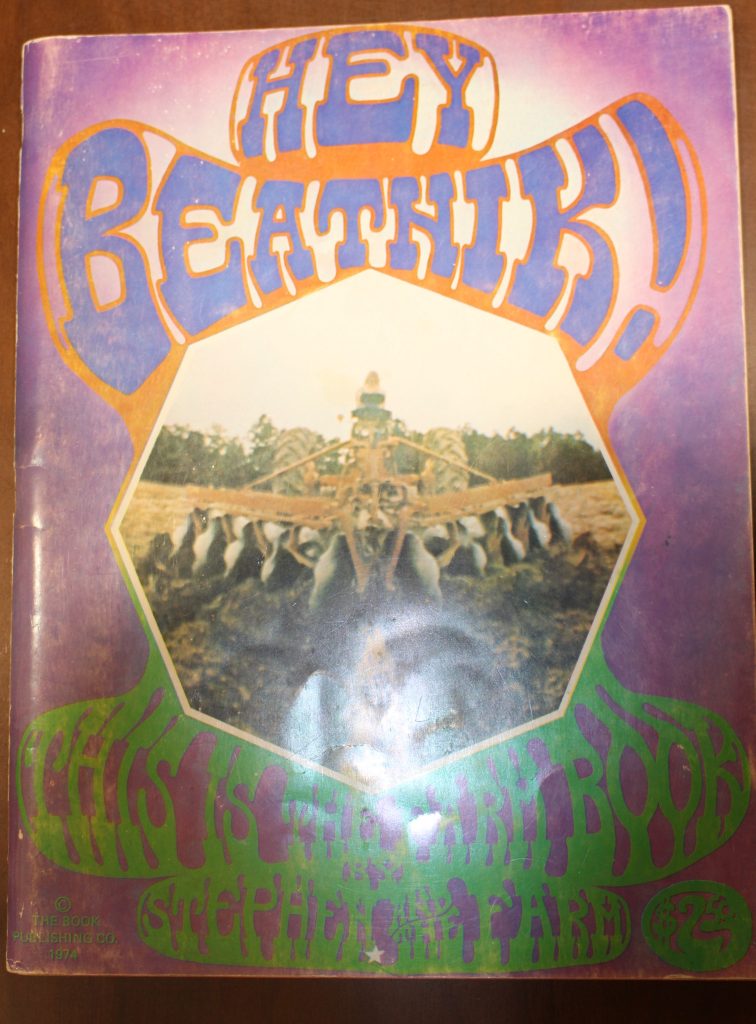
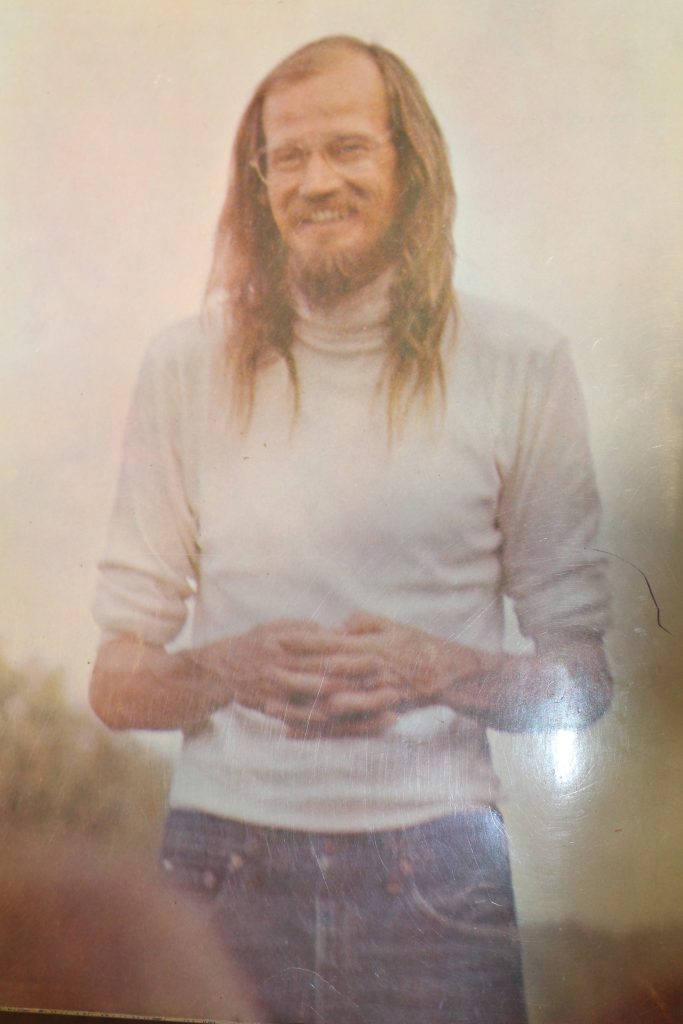
When Hey Beatnik! eventually started talking about farming itself, my mind was brought back to the idea of the vegetarian cookbooks I was studying. And while my aforementioned question was no longer the most prominent idea in my mind, it became the most prominent idea in my little brain bookshelf that I put aside for later.
We get a lot of insight into how The Farm actually farmed later on in the book, such as using horses to maintain The Farm’s 200 tillable acres. Remember, this is the 1970s, so the lack of machinery and equipment gives us an idea of this commune’s thoughts on manual labor. The menu itself was planned around farming, as the farmers had to figure out what and when to grow different foods to help fit the year’s menu. Yes, you read that right, the year’s menu. At The Farm, the menu was divided into cool-weather vegetables, warm-weather vegetables, summer field crops, and winter grains. There was a priority put into planting protein, which makes sense as that is what the vegetarian diet is based around. The Farm produced enough produce to feed 600 people a year! Which is a crazy amount and meant that time was of significance to make sure enough food was produced throughout the year. Additionally, The Farm was the largest working commune in the United States in 1977, which helps to show just how many people needed to be fed. However, it wasn’t only The Farm family eating the food.
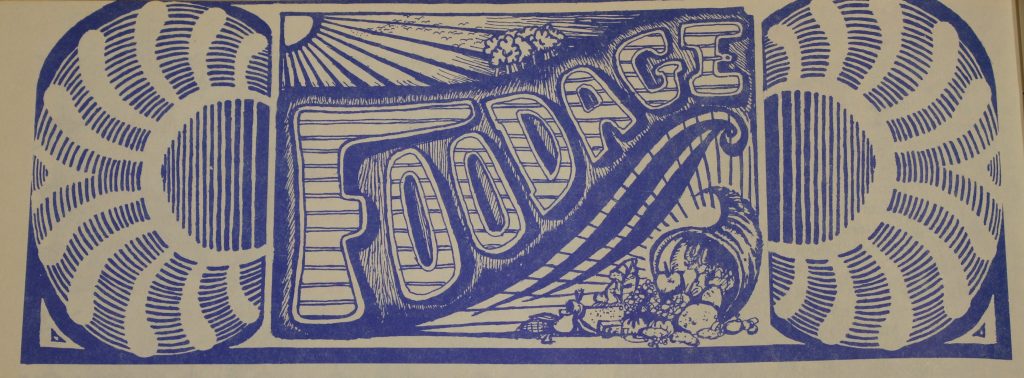
A big aspect of Stephen’s philosophy was neighbors. He emphasized that to love thy neighbor is to love thyself, and The Farm had Christian neighbors come and join morning meetings and night classes at The Farm. Not only does this mean more mouths to feed, but it also brings in the idea of more people to convert. Tapes of The Farm’s meetings were sometimes played during Church congregation, which showed that the Church itself approved of the ideologies and messages of The Farm. This again leads to the idea of conversion, as if the Christian Church approves of The Farm, then theoretically it’s okay for Christians to join The Farm if they want to because their religion approves of it and agrees with its ideals.
As for the farming itself, Michael and the Farming Crew state that they “don’t want to use herbicides because the vibes are too weird around them.” It makes sense that an LSD-spiritual commune would be concerned about the vibes of herbicides, right? Another interesting thing is that this specific section of the book, the first time vegetarianism is ever mentioned, is not even by Stephen himself, so again, I wonder what his true ideology is.
All of the different produce and dishes of The Farm were transformed into The Farm Vegetarian Cookbook. The cookbook starts with an introduction by Stephen, but the rest of it is recipes, the majority of which are created by women in the commune. Stephen states that the purpose of the cookbook and of vegetarianism itself is to help people live without meat. Some of the recipes created by women include “Janet’s Bagels” and “Janice’s Barbecue Gluten ‘Ribs.’” Another dish is called the soy “souffle,” which gets me into my next topic, soy.
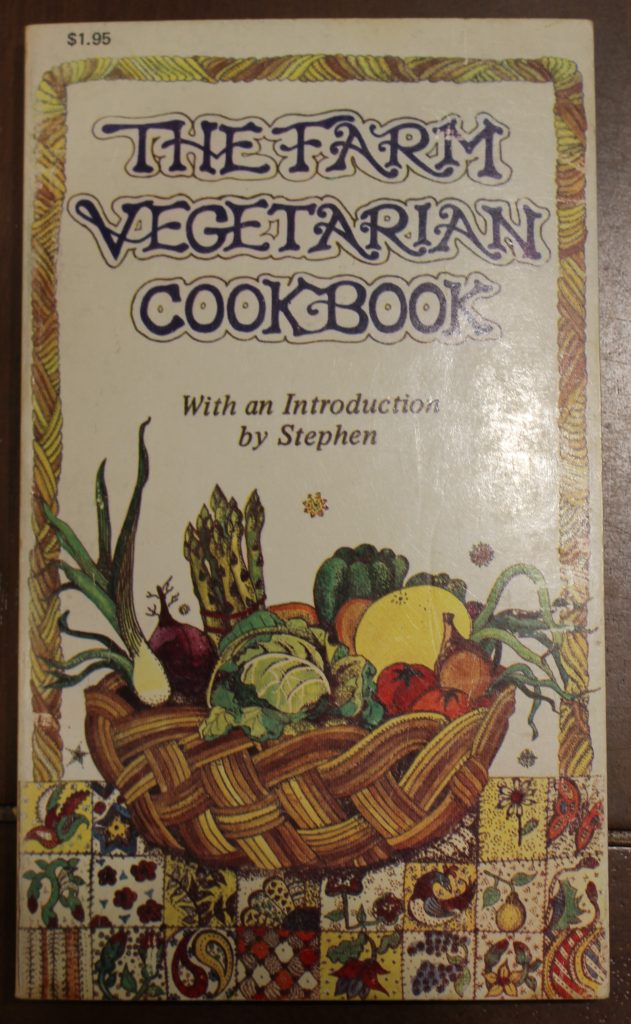

Without the consumption of meat, the protein a vegetarian consumes decreases immensely. Stephen’s solution is soybeans and the idea of living on soybeans. Yay Soybeans! is another Farm-produced book that highlights the significance of soy in a vegetarian diet. The book highlights the nutrition of soy as a whole, and also offers the reader what else to eat (“fresh” vegetables, fruits, grains, etc.) to have an overall, complete, and healthy diet. Some fun dishes from Yay Soybeans! are soybean stroganoff, soyburgers, soysage, and soy nuts! I have found that nuts have been a prominent ingredient in many vegetarian dishes throughout history, and I was not surprised when it appeared in The Farm’s cookbook.
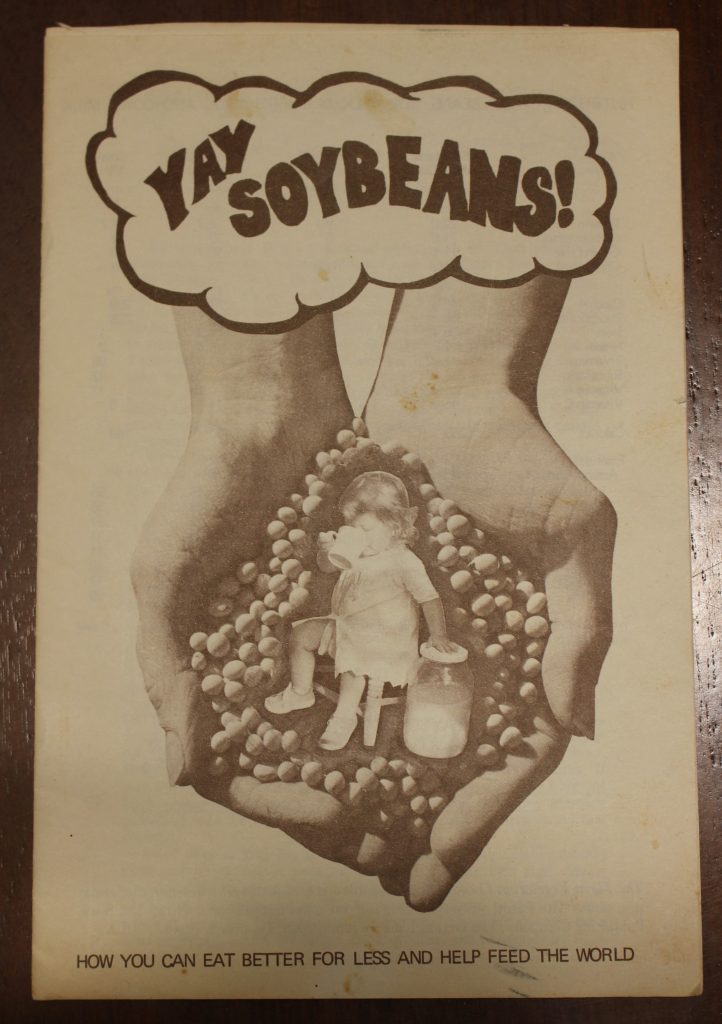
While I have my doubts as to Stephen’s truest intentions of vegetarianism, he gains some confidence back when he gives statistics as to how much produce is saved in a vegetarian diet as opposed to a carnivorous one. Stephen states, “suppose you eat ½ pound of meat and drink one pint of milk a day. The amount of grain and beans necessary to produce that much animal protein could feed ten people for that day. Two pounds of soybeans a week will give you all the protein you need,” and also, “half of the people in the world will go to sleep hungry tonight.” These quotations stood out to me during my research as it shows Stephen’s humanitarian reasoning for becoming a vegetarian. I also thought that these quotations were important in the conversion to vegetarianism as they present the maladies of eating meats, which might bring up guilt in the reader and then encourage them to convert to vegetarianism. The soybeans quote and data further this idea of converting specifically to soybean vegetarianism. Despite the humanitarian aspect, this again brings back my question: once you’ve listened to Stephen’s thoughts about vegetarianism and become a soybean vegetarian, what’s preventing you from listening to him again and becoming a member of The Farm?

Then we have the idea of the Gate and the Gateman. At the entrance to The Farm, there is a Gate. Every member of The Farm entered through that Gate at one time, the Gateman himself included, according to Stephen. However, Stephen also emphasizes that anyone is free to leave at any time. Whether this is actually true or not, it presents the idea that this is an easy-going community and not super-duper cultish.
Another odd aspect of The Farm is the Bank, and the idea of “paying back” The Farm. Despite being free to leave whenever one wishes, Stephen essentially states that if you want to be a member of The Farm, you have to go all in. Members must give The Farm everything they have, as The Farm will “take care of [their] needs.” One must give up all that they own and simply work on The Farm, and that is their payment for living on The Farm’s property itself. While we might view this as weird, it makes sense in developing a sense of community among The Farm members, bringing them closer together by all living with the same possessions and working alongside each other on The Farm.
Aside from vegetarianism, the other main focus of The Farm and Stephen’s ideals was drugs.
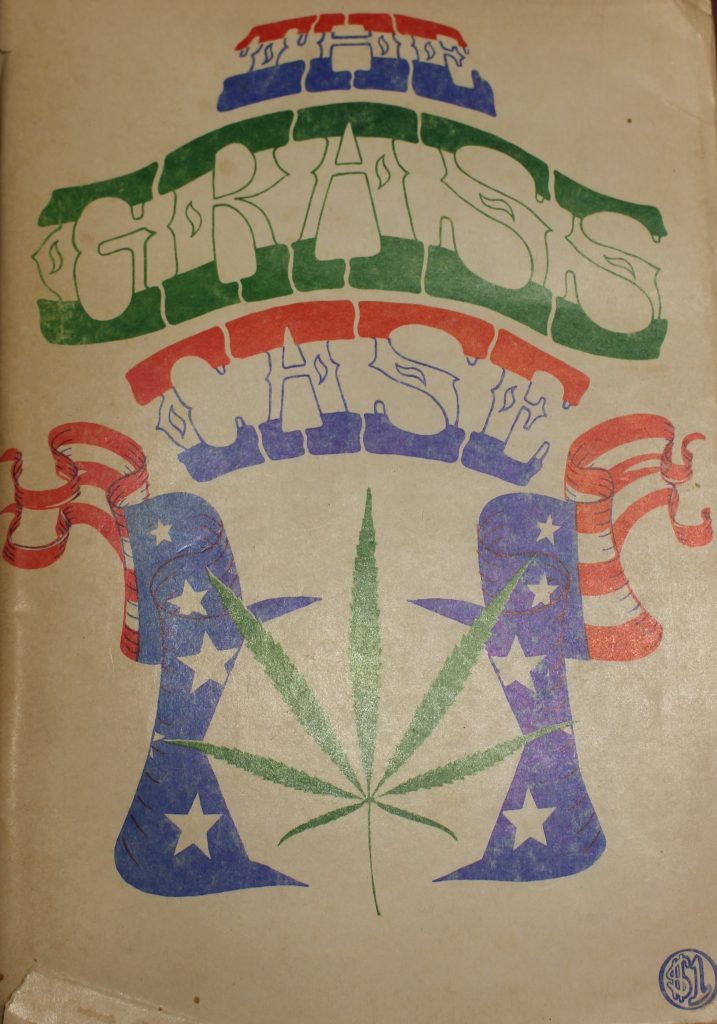
Drugs through spirit, more specifically. The Farm meditated every Sunday for an hour, which Stephen believed allowed his followers to get in contact with the “overmind” (what the “overmind” is, I couldn’t tell you.) Stephen believes that silence is good for the mind. and that silence via meditation allows one to get into contact with God and the Universe. So that makes me think that the “overmind” is God or the Universe? Or God and the Universe? Either way, it’s all very culty, which is ironic as the first line of The Farm Vegetarian Cookbook is Stephen saying that he does not want the cookbook to be “faddish or cultish or scare people off.” I don’t know about you, but the idea of an “overmind” is pretty culty to me, especially when Stephen goes on to state that he’s telepathic and can communicate with the ill, particularly a sick two-year-old. Additionally, despite Stephen stating that he doesn’t want to be “cultish or scare people off,” part of his ideology is that if you have a high enough energy level, you will be sick less often. This is a very cult-forward idea and indicates that members of the commune who fall ill are not strong enough believers. Stephen’s beliefs are again blurred here regarding what he really means when he preaches to his followers.
Stephen is kind of obsessed with psychedelics and believes that “they expand the rest of your mind” in a way that allows you to open up to others and experience other people in their true forms. He believes that LSD allows for better communication and connection, both with humans and with otherworldly figures, but also believes only in LSD and no other drugs. Part of Stephen’s philosophy is to have every member of The Farm be as close and connected of a community as possible, and he thinks this is most attainable by partaking in a drug that allows members to share their emotions more intimately and candidly than possible without said drug.
Another value that Stephen highlights frequently is compassion. Part of his entire vegetarian/commune thinking and mantra is to be kind and compassionate to one another so as to better understand each other on a spiritual level. Stephen believed that one could show compassion by being vegetarian and not eating more than necessary, and also being compassionate by not eating animal flesh.
Overall, it’s really interesting to think about how Stephen gained this following. The research I’ve done has made me realize that Stephen is a very good public speaker, and because he believes so deeply in what he preaches, he is very convincing to anyone who listens to him. To me, it all seems ridiculous (not the overall idea of being vegetarian, considering I am one), but I can appreciate his oratory abilities and his commitment and belief to his cause that allowed him to connect with his future followers. Despite his having some wacky ideas, I think that he overall was trying to show people his way of life no matter what, hence why he had some contradictions. I know that I posed the question as to what his actual goal was, and I ultimately think that the goal was to grow The Farm in any way possible. All in all, I think that he used vegetarianism partly to try and convert people, first to vegetarianism and then to The Farm, but he also acknowledged and stated the benefits, both physically and socially, of living a complete soybean vegetarian life. To that we can all proclaim, “yay soybeans!”
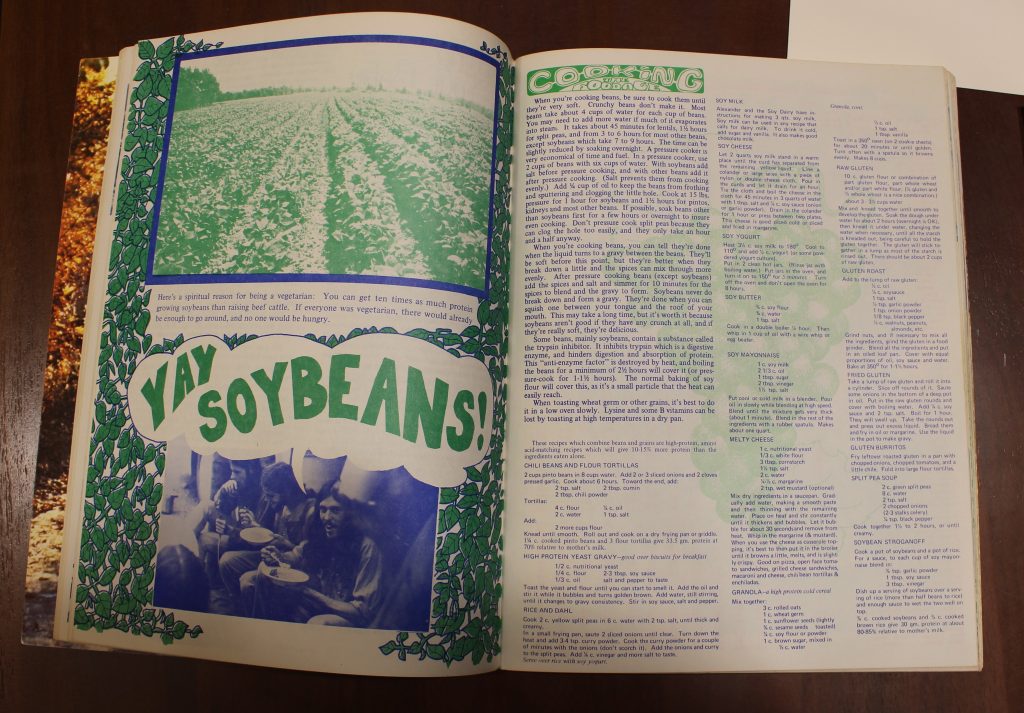
Bibliography
Kate Wenner. “How they Keep them Down on the Farm: On the Farm.” New York Times (1923-),
May 08, 1977.
https://proxy1.library.jhu.edu/login?url=https://www.proquest.com/historical-newspapers/how-th
ey-keep-them-down-on-farm/docview/123316941/se-2.
Dotzler, Louise, ed. The Farm Vegetarian Cookbook. Summertown, TN: Book Publishing Company, 1975.
Farm, Members of the. Yay Soybeans! Summertown, TN: Book Publishing Company, 1977.
Gaskin, Stephen. Hey Beatnik! N.p.: Book Publishing Company, 1974.

